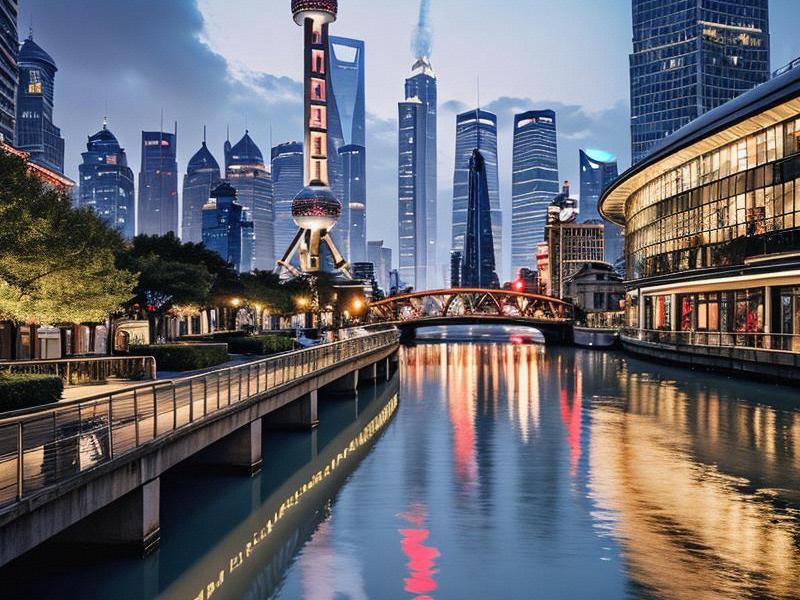
Shanghai, often referred to as the "Pearl of the Orient," is a city that seamlessly blends the old with the new. Its skyline, dominated by the iconic Oriental Pearl Tower and the futuristic Shanghai Tower, is a testament to the city's rapid urban development. Over the past few decades, Shanghai has transformed from a relatively small port city into one of the world's largest and most influential metropolises.
The urban planning of Shanghai is a marvel of modern engineering and design. The city is divided into distinct districts, each with its own unique character and charm. Pudong, the eastern part of Shanghai, is a showcase of modern architecture and financial might. It is home to the Lujiazui Financial District, where some of the world's tallest skyscrapers stand as symbols of China's economic prowess. In contrast, the historic Bund on the western side of the Huangpu River offers a glimpse into the city's colonial past, with its charming European-style buildings and bustling waterfront promenade.
Shanghai's urban development is not just about skyscrapers and modern infrastructure; it also focuses on creating a livable and sustainable environment for its residents. The city has invested heavily in green spaces, public transportation, and environmental conservation. The Shanghai Greenway Network, a network of parks, riverside paths, and bike lanes, provides residents and visitors with ample opportunities to enjoy nature and outdoor activities. The city's extensive metro system, one of the most efficient in the world, ensures seamless connectivity across the urban sprawl.
Cultural heritage is another defining feature of Shanghai. The city has a rich history that dates back thousands of years, and its cultural tapestry is woven with influences from various dynasties, foreign settlements, and modern globalization. Shanghai's art scene is particularly noteworthy, with the city being home to numerous galleries, theaters, and cultural institutions. The Shanghai Museum, one of the largest and most prestigious museums in China, houses an impressive collection of ancient Chinese art, including ceramics, calligraphy, and paintings.
上海花千坊龙凤 The city's literary and artistic heritage is deeply rooted in its history as a cosmopolitan hub. During the early 20th century, Shanghai was known as the "Paris of the East," attracting writers, artists, and intellectuals from all over the world. This legacy continues to thrive today, with the city hosting numerous literary festivals, art exhibitions, and cultural events. The Bund Literary Festival, for example, brings together writers and readers from around the globe to celebrate the power of literature and foster cross-cultural exchanges.
Shanghai's culinary scene is another aspect of its cultural heritage that deserves special mention. The city is a melting pot of flavors, with influences from traditional Chinese cuisine, as well as international dishes. From the famous xiaolongbao (soup dumplings) in Nanxiang to the Michelin-starred restaurants in the French Concession, Shanghai offers a diverse and delectable culinary experience. The city's night markets and food streets are also popular destinations for both locals and tourists, offering a taste of the authentic Shanghai flavors.
In recent years, Shanghai has been actively promoting its cultural heritage through various initiatives. The city has established cultural districts, such as the former French Concession and the Yangpu Riverside area, which have been revitalized to preserve and showcase the city's historical architecture and cultural landmarks. These districts not only serve as tourist attractions but also provide a sense of identity and continuity for the local community.
上海花千坊爱上海 Shanghai's global influence is evident in its role as a major financial hub and a center for international trade and diplomacy. The city is home to the Shanghai Stock Exchange, one of the largest stock exchanges in the world, and is a key player in global financial markets. Its strategic location on the East Coast of China, coupled with its well-developed infrastructure and business-friendly environment, makes it an attractive destination for multinational corporations and international organizations.
The city's role in international trade is further enhanced by its status as a major port. The Port of Shanghai, one of the busiest and most efficient ports in the world, handles a significant portion of China's foreign trade. The port's modern facilities and advanced logistics capabilities make it a vital link in the global supply chain.
Shanghai's global influence is not limited to the economic sphere; it also plays a significant role in cultural exchange and international cooperation. The city has hosted numerous international events, such as the World Expo in 2010 and the G20 Summit in 2016, which brought together leaders and delegates from around the world to discuss pressing global issues. These events have further cemented Shanghai's reputation as a global city and a hub for international collaboration.
上海品茶网 The city's commitment to sustainability and environmental protection is also reflected in its efforts to promote green development and reduce carbon emissions. Shanghai has set ambitious targets to become a low-carbon city by 2040, with initiatives such as the development of renewable energy sources, the promotion of electric vehicles, and the improvement of waste management systems. These efforts not only contribute to the city's environmental goals but also enhance the quality of life for its residents.
In conclusion, Shanghai is a city that embodies the spirit of modernity, innovation, and cultural fusion. Its rapid urban development, rich cultural heritage, and growing global influence make it a unique and dynamic metropolis. As Shanghai continues to evolve and embrace the challenges and opportunities of the 21st century, it remains a beacon of progress and a symbol of China's rise on the global stage.
The city's ability to balance tradition and modernity, while maintaining its unique identity and cultural heritage, is a testament to the resilience and adaptability of its people. Whether you are exploring the historic Bund, savoring the flavors of Shanghai cuisine, or marveling at the city's futuristic skyline, Shanghai offers an unforgettable experience that captures the essence of a global metropolis with endless charm.
